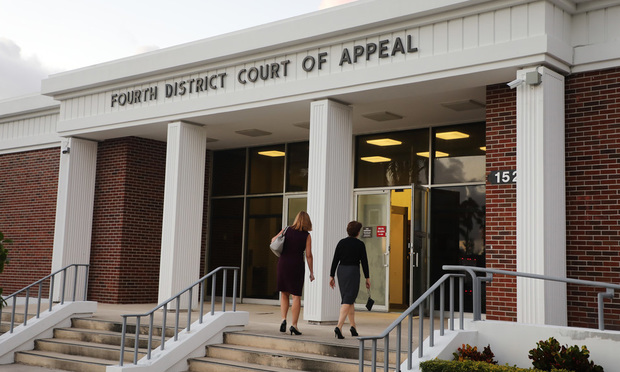Foreclosure Defense Lawyer Wins Case But Can't Collect Fees
The issue of attorney fees for foreclosure defense lawyer has taken center stage in recent weeks.
March 07, 2018 at 03:03 PM
3 minute read
 Fourth District Court of Appeal. Photo: J. Albert Diaz
Fourth District Court of Appeal. Photo: J. Albert Diaz
Legal standing — the issue that once tilted foreclosure cases in the borrowers' favor — is again proving to be problematic for defense lawyers in appellate court.
Wednesday, the Fourth District Court of Appeal issued a single-paragraph decision, reversing an attorney fees award in a case that turned on standing, or legal grounds to participate in a lawsuit.
The order was the latest of at least three rulings that allowed borrowers to prevail over lenders, but not collect attorney fees that would typically go to the prevailing party.
The case pitted homeowner Joselito Martins against plaintiff Nationstar Mortgage LLC. At trial, Martins proved the plaintiff lacked the legal right to bring suit, by establishing that Nationstar was not the holder of the promissory note. He then moved to collect attorney fees under a clause in the mortgage and the reciprocal provision of section 57.105(7) of the Florida Statutes.
Martin County Senior Judge George A. Shahood ruled for the defendant, but a judicial panel overturned that decision, citing case law from an April 2017 ruling in Nationstar Mortgage v. Glass.
“Because '[a] party that prevails on its argument that dismissal is required because the plaintiff lacked standing to sue upon the contract cannot recover fees based upon a provision in that same contract,' we reverse and direct the trial court to vacate the final judgment awarding fees to Mr. Martins,” Fourth DCA Judge Dorian K. Damoorgian wrote in a unanimous decision with Judges Carole Y. Taylor and Melanie G. May.
The judicial panel reversed Shahood and directed the trial court to vacate the final judgment awarding fees to Martins.
Morgan W. Bates and Allison Morat of Pearson Bitman in Maitland represented Nationstar on appeal, while Jeffrey M. Clyman of Steele Law in Hobe Sound was counsel for Martins.
The issue of attorney fees has taken center stage in recent weeks as foreclosure defense attorneys face a Catch-22 scenario: Defendants, who won cases by arguing their lender was not the rightful owner of the real estate debt, are now finding they can't recover fees from financial institution that weren't party to contracts that allow the prevailing side to recoup litigation expenses.
Now, some foreclosure attorneys are saying the recent appellate rulings are a strategy from courts to discourage lawyers from representing homeowners who defaulted on mortgages. They claim courts use their own arguments against them.
One critic, Weston attorney Roy Oppenheim, said judges were sending a message to him and other foreclosure defense lawyers: They may prevail in the courtroom but won't get paid by the opposing side.
“If the courts think that's how they're going to shut down the Roy Oppenheims of the world, they're mistaken,” said Oppenheim, co-founder and senior partner at Oppenheim Law. “They've emboldened us.”
The issue is now before Florida's Supreme Court, which in February accepted discretionary jurisdiction over the precedent-setting Nationstar Mortgage v. Glass case.
This content has been archived. It is available through our partners, LexisNexis® and Bloomberg Law.
To view this content, please continue to their sites.
Not a Lexis Subscriber?
Subscribe Now
Not a Bloomberg Law Subscriber?
Subscribe Now
NOT FOR REPRINT
© 2025 ALM Global, LLC, All Rights Reserved. Request academic re-use from www.copyright.com. All other uses, submit a request to [email protected]. For more information visit Asset & Logo Licensing.
You Might Like
View All
South Florida Real Estate Lawyers See More Deals Flow, But Concerns Linger
6 minute read
Vedder Price Shareholder Javier Lopez Appointed to Miami Planning, Zoning & Appeals Board
2 minute read
Real Estate Trends to Watch in 2025: Restructuring, Growth, and Challenges in South Florida
3 minute readTrending Stories
- 1Trump's Pick for SEC Chair Likely to Stymie Shareholder Proposals from ESG Advocates
- 2Adobe’s Chief Cyber Legal & Privacy Officer Talks Managing Gen AI Risks, Cyber Training
- 3The M&A Partners Who Drove the Most Business as Deal Leads Last Year
- 4Recent Ford Bronco Battery Recall Draws Pa. Class Action
- 5Office of Special Counsel Chief Challenges Firing 'Without Cause'
Who Got The Work
J. Brugh Lower of Gibbons has entered an appearance for industrial equipment supplier Devco Corporation in a pending trademark infringement lawsuit. The suit, accusing the defendant of selling knock-off Graco products, was filed Dec. 18 in New Jersey District Court by Rivkin Radler on behalf of Graco Inc. and Graco Minnesota. The case, assigned to U.S. District Judge Zahid N. Quraishi, is 3:24-cv-11294, Graco Inc. et al v. Devco Corporation.
Who Got The Work
Rebecca Maller-Stein and Kent A. Yalowitz of Arnold & Porter Kaye Scholer have entered their appearances for Hanaco Venture Capital and its executives, Lior Prosor and David Frankel, in a pending securities lawsuit. The action, filed on Dec. 24 in New York Southern District Court by Zell, Aron & Co. on behalf of Goldeneye Advisors, accuses the defendants of negligently and fraudulently managing the plaintiff's $1 million investment. The case, assigned to U.S. District Judge Vernon S. Broderick, is 1:24-cv-09918, Goldeneye Advisors, LLC v. Hanaco Venture Capital, Ltd. et al.
Who Got The Work
Attorneys from A&O Shearman has stepped in as defense counsel for Toronto-Dominion Bank and other defendants in a pending securities class action. The suit, filed Dec. 11 in New York Southern District Court by Bleichmar Fonti & Auld, accuses the defendants of concealing the bank's 'pervasive' deficiencies in regards to its compliance with the Bank Secrecy Act and the quality of its anti-money laundering controls. The case, assigned to U.S. District Judge Arun Subramanian, is 1:24-cv-09445, Gonzalez v. The Toronto-Dominion Bank et al.
Who Got The Work
Crown Castle International, a Pennsylvania company providing shared communications infrastructure, has turned to Luke D. Wolf of Gordon Rees Scully Mansukhani to fend off a pending breach-of-contract lawsuit. The court action, filed Nov. 25 in Michigan Eastern District Court by Hooper Hathaway PC on behalf of The Town Residences LLC, accuses Crown Castle of failing to transfer approximately $30,000 in utility payments from T-Mobile in breach of a roof-top lease and assignment agreement. The case, assigned to U.S. District Judge Susan K. Declercq, is 2:24-cv-13131, The Town Residences LLC v. T-Mobile US, Inc. et al.
Who Got The Work
Wilfred P. Coronato and Daniel M. Schwartz of McCarter & English have stepped in as defense counsel to Electrolux Home Products Inc. in a pending product liability lawsuit. The court action, filed Nov. 26 in New York Eastern District Court by Poulos Lopiccolo PC and Nagel Rice LLP on behalf of David Stern, alleges that the defendant's refrigerators’ drawers and shelving repeatedly break and fall apart within months after purchase. The case, assigned to U.S. District Judge Joan M. Azrack, is 2:24-cv-08204, Stern v. Electrolux Home Products, Inc.
Featured Firms
Law Offices of Gary Martin Hays & Associates, P.C.
(470) 294-1674
Law Offices of Mark E. Salomone
(857) 444-6468
Smith & Hassler
(713) 739-1250







